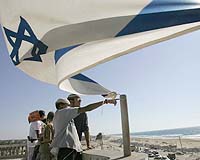| . |  |
. |
Ramallah, Palestinian Territories (AFP) Sept 1, 2010 Ten years after the failed Camp David peace talks ushered in a bloody uprising, many Palestinians fear they are again embarking on US-backed negotiations that could end in failure -- or worse. Palestinian leader Mahmud Abbas has reluctantly agreed to meet with Israeli Prime Minister Benjamin Netanyahu in Washington on Thursday, but scepticism is rife given the violence that surrounded past peace bids. "I think this is the last chance. There will be no government that will be as flexible as this one," said Hanan Ashrawi, a senior member of Abbas's Palestine Liberation Organisation (PLO), which has held successive rounds of direct talks with Israel since the signing of the 1993 Oslo accords. "If it fails it will be a huge letdown internally... and as the weaker side, the Palestinians will be blamed," she said. The nearly two decades of on-again, off-again talks have never led to a peace agreement but have on more than one occasion been followed by outbreaks of violence and years of mutual recriminations. The last round of direct talks stopped when Israel invaded Gaza to halt Hamas rocket fire in late 2008, and the collapse of the Camp David peace talks in 2000 led to the eruption of the second Palestinian intifada, or uprising. The pessimism expressed by Israelis and Palestinians alike is largely rooted in the events of 2000, when the two sides seemed on the verge of reaching an agreement just months before declaring all-out war. In July of that year US president Bill Clinton, centre-left Israeli prime minister Ehud Barak and Palestinian leader Yasser Arafat had huddled for two weeks at the presidential retreat and seemed days away from an agreement. Three months later, the 2000 Palestinian uprising erupted, ushering in a hawkish Israeli government and years of Palestinian suicide bombings and massive Israeli incursions in the occupied territories. Arafat was widely blamed for the diplomatic failure, and Israel's peace movement withered as the escalating violence convinced many Israelis the Palestinians had never been serious about resolving the decades-old conflict. The Palestinians felt they were unfairly blamed for the failure of the talks, accusing the United States of not exerting enough pressure on Israel and pointing to the escalating number of Israeli settlers in the West Bank. More than 100,000 Israeli settlers lived in the West Bank when direct peace talks were first launched on the White House lawn in 1993. By 2000 that number had doubled, and today 300,000 settlers live in the West Bank, with another 200,000 in annexed east Jerusalem, lands occupied by Israel in the 1967 Six Day War and expected to form the bulk of the Palestinian state. "Every US administration has told us, 'enter the negotiations and that will stop the settlements,' but the settlements have not stopped," Ashrawi said. Now many fear the process will be repeated, as they have watched Abbas bow to US pressure to relaunch talks without securing his sought-after settlement freeze from Israel's right-wing government. "They thought it was enough to bring Yasser Arafat to Camp David and exert US pressure on him (to) sign... Now it's the same with Abu Mazen," said former Palestinian minister Qaddura Fares, referring to Abbas with his popular nickname. "If these negotiations fail we will pay the price," he added. "We lose time, we lose credibility, we lose the support of the people... We will lose those who continue hoping that there's a possibility for peace," he said. "The Palestinian leadership has become a hostage of the peace process, but they should try at least one time to say no." Robert Malley, an advisor to Clinton during the Camp David talks who now heads the International Crisis Group (ICG) in the Middle East and North Africa, agrees that Abbas found himself in a tough position. "For the Palestinian national movement, the choice was between going into talks that they do not believe in and no alternative at all," he said, adding that Arafat had faced a similar dilemma in 2000. But unlike Arafat, Abbas presides over a deeply divided movement, with the Islamist Hamas movement -- which has always opposed any talks with Israel -- ruling the Gaza Strip and holding a majority in the Palestinian parliament. "President Abbas comes to the negotiations where he does not necessarily represent the whole of the Palestinian population," Malley said. "Arafat... represented a Palestinian consensus." However, he said the current negotiators on all sides would be in a better position than their predecessors, if only because they could learn from past failures. "What is unacceptable for the one or the other is clearly defined," he said. "They've already set markers."
Share This Article With Planet Earth
Related Links
 Israel PM assures right wing ahead of Washington summit
Israel PM assures right wing ahead of Washington summitJerusalem (AFP) Aug 30, 2010 Prime Minister Benjamin Netanyahu tried to reassure his right-wing Likud bloc in Israel's ruling coalition on Monday he would not bow to territorial concessions in peace talks with the Palestinians. "You don't need to worry. Nobody needs to teach me what it is to love Eretz Israel," he told Likud members, using a biblical term for the Land of Israel, at a meeting to prepare for the Jewish Ne ... read more |
|
| The content herein, unless otherwise known to be public domain, are Copyright 1995-2010 - SpaceDaily. AFP and UPI Wire Stories are copyright Agence France-Presse and United Press International. ESA Portal Reports are copyright European Space Agency. All NASA sourced material is public domain. Additional copyrights may apply in whole or part to other bona fide parties. Advertising does not imply endorsement,agreement or approval of any opinions, statements or information provided by SpaceDaily on any Web page published or hosted by SpaceDaily. Privacy Statement |